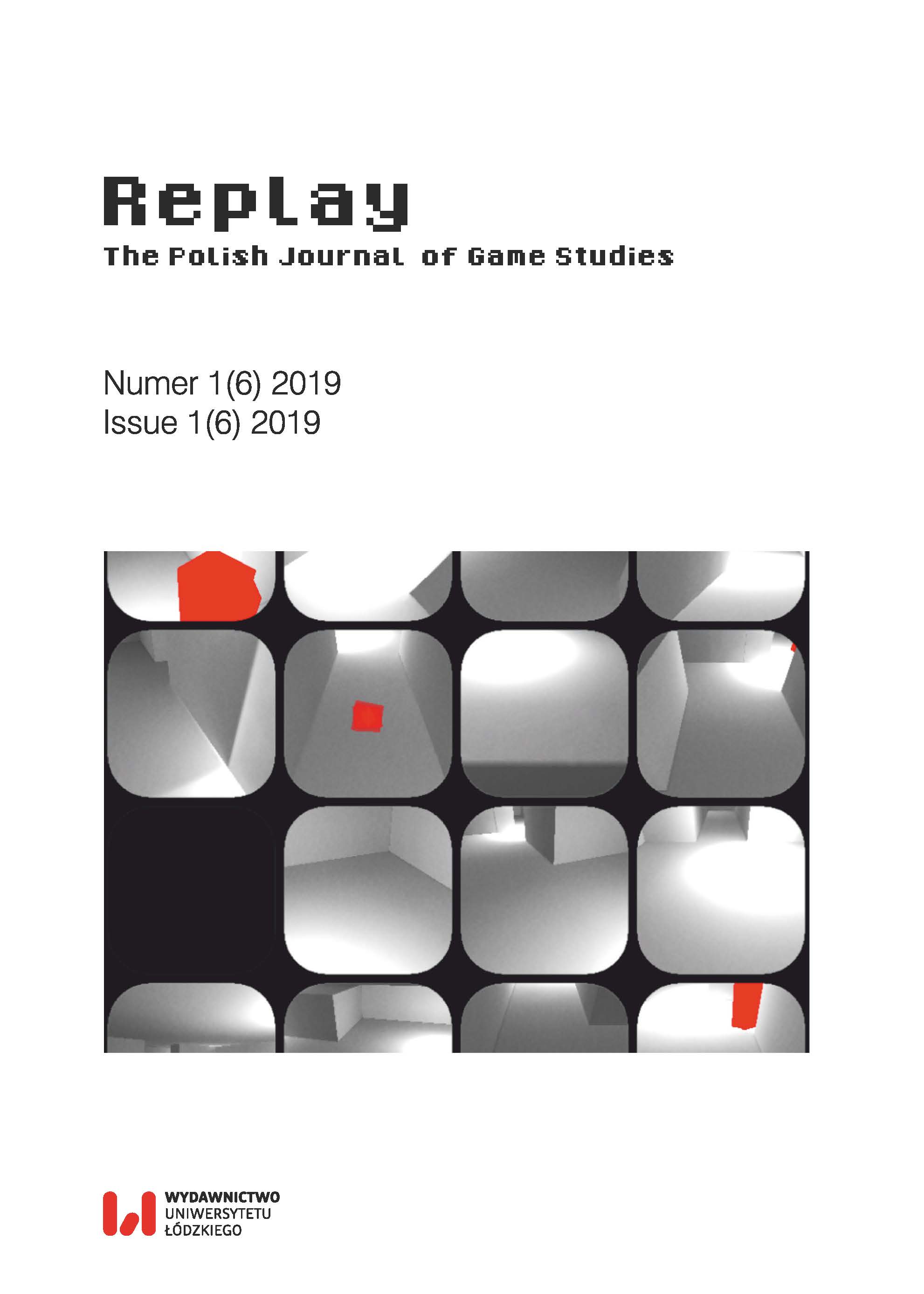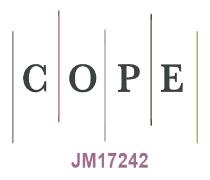Praktyczno-teoretyczny model grania cyfrowego
DOI:
https://doi.org/10.18778/2391-8551.06.01Słowa kluczowe:
granie cyfrowe, teoria praktyki, Pierre Bourdieu, kompetencje ludyczne, groznawstwo, granie, umiejętności graczaAbstrakt
Badania nad naturą grania są utrudnione przez różnorodność możliwych form, jakie może przybierać ta działalność. W artykule tym podejmuję ten problem, analizując gry (cyfrowe) pod szyldem teorii praktyki i próbuję rzucić więcej światła na praktyczne aspekty kompetencji ludycznych. Opierając się na założeniach teoretycznych i koncepcyjnych Pierre’a Bourdieu, przedstawiam ogólny model gier cyfrowych jako formy usytuowanej praktyki człowieka, a następnie prezentuję studium przypadku, zaprojektowane w celu przetestowania i skorygowania wstępnej wersji modelu. Choć poszerzenie zakresu stosowalności modelu wymaga badań na większej populacji graczy, wyniki naszego badania potwierdzają poprawność naszego modelu rozumianego jako teoria wyznaczania i osadzania praktyk wyrosłych z artefaktów ludycznych.
Bibliografia
Apperley, Thomas H. (2006), Genre and game studies: Toward a critical approach to video game genres, “Simulation & Gaming”, no. 37(1), pp. 6–23.
Google Scholar
DOI: https://doi.org/10.1177/1046878105282278
Arsenault, Dominic (2009), Video game genre, evolution and innovation, “Eludamos. Journal for Computer Game Culture”, no. 3(2), pp. 149–176.
Google Scholar
DOI: https://doi.org/10.7557/23.6003
Barr, Pippin (2008), Video game values: Play as human-computer interaction (Doctoral dissertation), Wellington: Victoria University of Wellington.
Google Scholar
Bourdieu, Pierre (1989), Social space and symbolic power, “Sociological theory”, no. 7(1), pp. 14–25.
Google Scholar
DOI: https://doi.org/10.2307/202060
Bourdieu, Pierre (1990), In other words: Essays towards a reflexive sociology, Stanford CA: Stanford University Press.
Google Scholar
DOI: https://doi.org/10.1515/9781503621558
Bourdieu, Pierre (1991), Language and symbolic power, Cambridge MA: Harvard University Press.
Google Scholar
Bourdieu, Pierre (2013), Outline of a theory of practice (Trans. R. Nice), Cambridge: Cambridge University Press. (Original work published 1972).
Google Scholar
Bourdieu, Pierre (2014), The logic of practice (Trans. R. Nice), Stanford CA: Stanford University Press. (Original work published 1980).
Google Scholar
Bourdieu, Pierre, Wacquant, Loïc (1992), An invitation to reflexive sociology, Cambridge: Polity Press.
Google Scholar
Bourgonjon, Jeroen (2014), The meaning and relevance of video game literacy, “CLCWeb: Comparative Literature and Culture”, no. 16(5), pp. 1–8.
Google Scholar
DOI: https://doi.org/10.7771/1481-4374.2510
Bryman, Alan (2012), Social Research Methods (4th ed.), Oxford: Oxford University Press.
Google Scholar
Buckingham, David (2008), What do young people need to know about digital media, [in:] Colin Lankshear, Michele Knobel (eds.), Digital literacies: Concepts, policies and practices, Peter Lang Publishing, pp. 73–88.
Google Scholar
Buckingham, David, Burn, Andrew (2007), Game literacy in theory and practice, “Journal of Educational Multimedia and Hypermedia”, no. 16(3), pp. 323–349.
Google Scholar
Consalvo, Mia (2007), Cheating: Gaining Advantage in Videogames, Cambridge: MIT Press.
Google Scholar
DOI: https://doi.org/10.7551/mitpress/1802.001.0001
Couldry, Nick (2012), Media, society, world: Social theory and digital media practice, Cambridge: Polity Press.
Google Scholar
Eisenhardt, Kathleen M. (1989), Building theories from case study research, “Academy of Management Review”, no. 14(4), pp. 532–550.
Google Scholar
DOI: https://doi.org/10.5465/amr.1989.4308385
Flanagan, Mary (2003), SIMple and personal: Domestic space and The Sims, [in:] Proceedings of the Melbourne Digital Arts and Culture Conference, Melbourne, May 19–23, pp. 1–4.
Google Scholar
Flyvbjerg, Bent (2006), Five misunderstandings about case-study research, “Qualitative inquiry”, no. 12(2), pp. 219–245.
Google Scholar
DOI: https://doi.org/10.1177/1077800405284363
Gee, James P. (2003), What video games have to teach us about learning and literacy, New York: Palgrave Macmillan.
Google Scholar
DOI: https://doi.org/10.1145/950566.950595
Huang, Jeff, Yan, Eddie, Cheung, Gifford, Nagappan, Nachiappan, Zimmermann, Thomas (2017), Master maker: Understanding gaming skill through practice and habit from gameplay behavior, “Topics in Cognitive Science”, no. 9(2), pp. 437–466.
Google Scholar
DOI: https://doi.org/10.1111/tops.12251
Iacovides, Ioanna (2009), Exploring the link between player involvement and learning within digital games, [in:] Proceedings of the 23rd British HCI group annual conference on people and computers: Celebrating people and technology, British Computer Society, pp. 29–34.
Google Scholar
DOI: https://doi.org/10.14236/ewic/HCI2009.4
Järvinen, Aki S. (2009), Games without Frontiers: Methods for Game Studies and Design (Doctoral dissertation), Tampere, Finland: University of Tampere.
Google Scholar
Jenkins, Richard (1992), Pierre Bourdieu, London: Routledge.
Google Scholar
Juul, Jesper (2005), Half-real: Video games between real rules and fictional worlds, Cambridge MA: MIT Press.
Google Scholar
Kirkpatrick, Graeme (2015), The formation of gaming culture: UK gaming magazines, 1981–1995, Basingstoke: Palgrave Macmillan.
Google Scholar
DOI: https://doi.org/10.1057/9781137305107
Klevjer, Rune, Hovden, Jan F. (2017), The Structure of Videogame Preference, “Game Studies”, no. 17(2).
Google Scholar
Leino, Olli T. (2009), Understanding Games as Played: Sketch for a first-person perspective for computer game analysis, [in:] Proceedings of the Philosophy of Computer Games Conference, Oslo 2009, pp. 1–15.
Google Scholar
Lynch, Julianne, Rowlands, Julie, Gale, Trevor, Skourdoumbis, Andrew (eds.), (2016), Practice Theory and Education: Diffractive readings in professional practice, Routledge.
Google Scholar
DOI: https://doi.org/10.4324/9781315640532
Malaby, Thomas M. (2007), Beyond play: A new approach to games, “Games and culture”, no. 2(2), pp. 95–113.
Google Scholar
DOI: https://doi.org/10.1177/1555412007299434
Ortner, Sherry B. (1984), Theory in Anthropology since the Sixties, “Comparative studies in society and history”, no. 26(1), pp. 126–166.
Google Scholar
DOI: https://doi.org/10.1017/S0010417500010811
Rouse, Joseph (2007), Practice theory, [in:] Stephen P. Turner, Mark W. Risjord (eds.), Philosophy of Anthropology and Sociology. Handbook of the Philosophy of Science, Elsevier, pp. 639–683.
Google Scholar
DOI: https://doi.org/10.1016/B978-044451542-1/50020-9
Shaw, Adrienne (2013), Rethinking game studies: A case study approach to video game play and identification, “Critical Studies in Media Communication”, no. 30(5), pp. 347–361.
Google Scholar
DOI: https://doi.org/10.1080/15295036.2012.701013
Squire, Kurt (2006), From content to context: Videogames as designed experience, “Educational Researcher”, no. 35(8), pp. 19–29.
Google Scholar
DOI: https://doi.org/10.3102/0013189X035008019
Squire, Kurt (2008), Video-game literacy: A literacy of expertise, [in:] Donald J. Leu, Julie Coiro, Michele Knobel, Colin Lankshear, Handbook of research on new literacies, pp. 635–670.
Google Scholar
Strauss, Anselm, Corbin, Juliet (1998), Basics of qualitative research: Techniques and procedures for developing grounded theory, Thousand Oaks CA: Sage.
Google Scholar
Tengblad, Stefan (ed.) (2012), The work of managers: Towards a practice theory of management, Oxford University Press.
Google Scholar
DOI: https://doi.org/10.1093/acprof:oso/9780199639724.003.0018
Vahlo, Jukka (2017), An Enactive Account of the Autonomy of Videogame Gameplay, “Game Studies”, no. 17(1).
Google Scholar
Wittgenstein, Ludwig (1958), Philosophical investigations (2nd ed.), Oxford, UK: Basil Blackwell. (Original work published 1953).
Google Scholar
Yin, Robert K. (2009), Case study research: Design and methods, Los Angeles CA: Sage.
Google Scholar
Zagal, José P. (2010), Ludoliteracy: Defining, understanding, and supporting games education, LaVergne TN: ETC Press.
Google Scholar
Zimmerman, Eric (2009), Gaming Literacy: Game Design as a Model for Literacy in the Twenty-First Century, [in:] Mark J.P. Wolf, Bernard Perron (eds.), The video game theory reader 2, London: Routledge, pp. 23–31.
Google Scholar
Bungie. (2003). Halo: Combat Evolved [Windows]. Redmond, WA: Microsoft Game Studios.
Google Scholar
Firaxis Games. (2010). Civilization V [Windows]. Novato, CA: 2K Games.
Google Scholar
iD Software. (1993). Doom [MS-DOS]. New York City, NY: GT Interactive Software Corp.
Google Scholar
iD Software. (1996). Quake [MS-DOS]. New York City, NY: GT Interactive Software Corp.
Google Scholar
Maxis. (2000-present). The Sims [Windows]. Redwood City, CA: Electronic Arts.
Google Scholar
Metanet Software. (2016). N++ [Windows]. Toronto, Ontario: Metanet Software.
Google Scholar
Pajitnov, A., Pavlovsky, D., Gerasimov, V. (1986). Tetris. Moscow, Russia: AcademySoft.
Google Scholar
Squaresoft. (1998). Final Fantasy Tactics [PlayStation]. San Mateo, CA: Sony Computer Entertainment.
Google Scholar
Team Meat. (2010). Super Meat Boy [Windows]. Team Meat.
Google Scholar
Terry Cavanagh. (2014). VVVVVV [iOS]. Santa Ana, CA: Nicalis, Inc.
Google Scholar
Ubisoft Montpellier. (2013). Rayman Legends [Windows]. Montreuil, France: Ubisoft.
Google Scholar
Pobrania
Opublikowane
Jak cytować
Numer
Dział
Licencja

Utwór dostępny jest na licencji Creative Commons Uznanie autorstwa – Użycie niekomercyjne – Bez utworów zależnych 4.0 Międzynarodowe.










